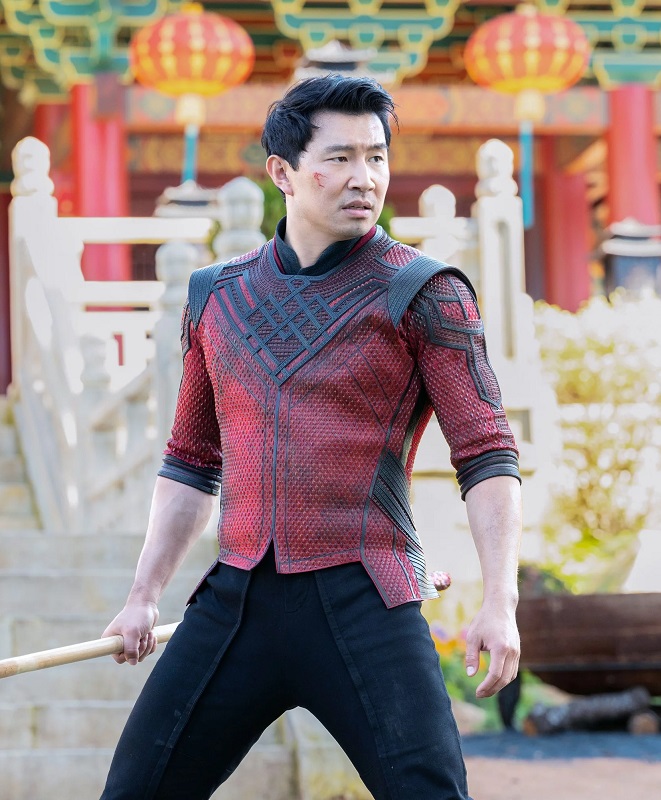
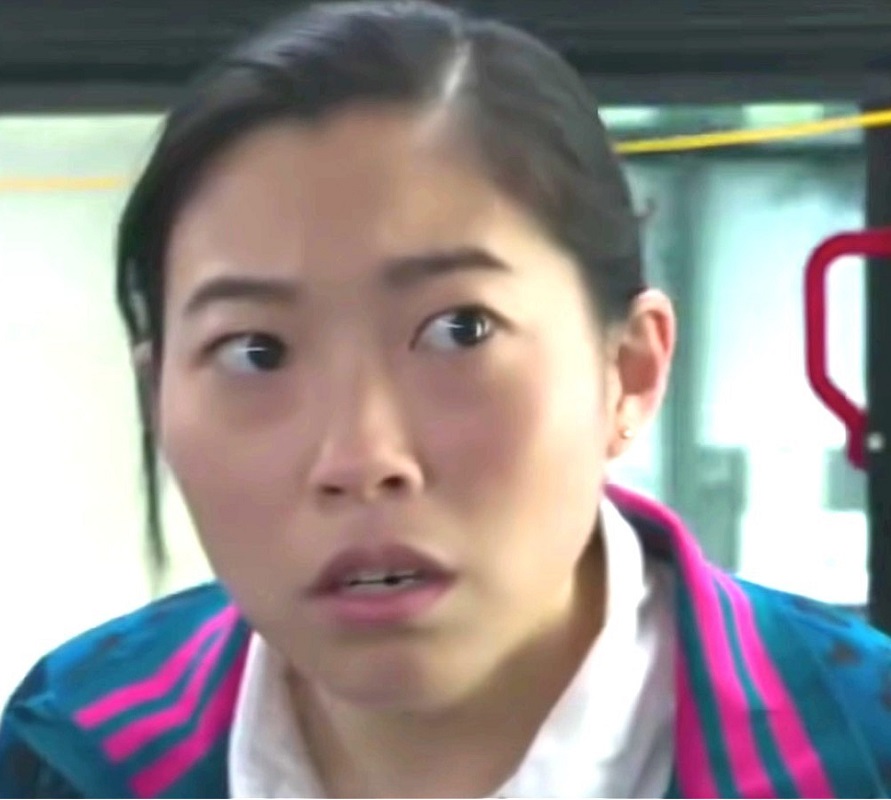
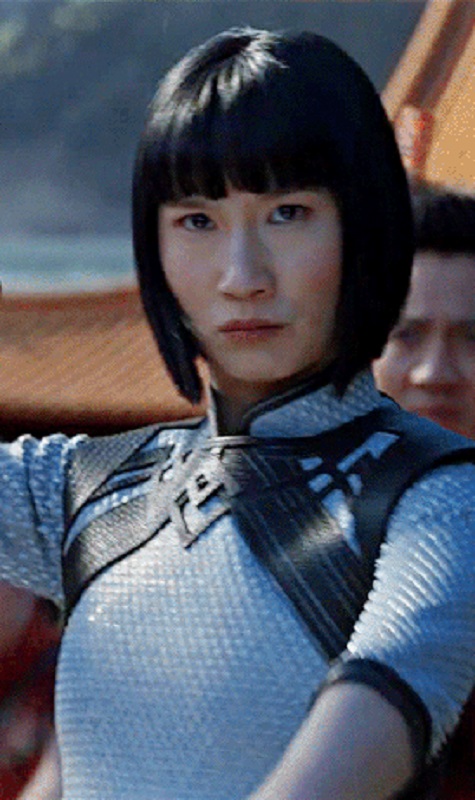
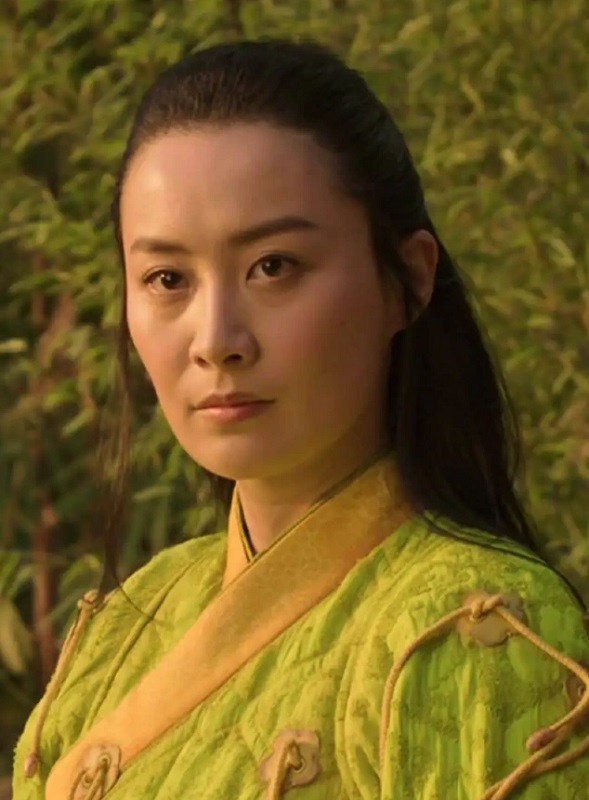
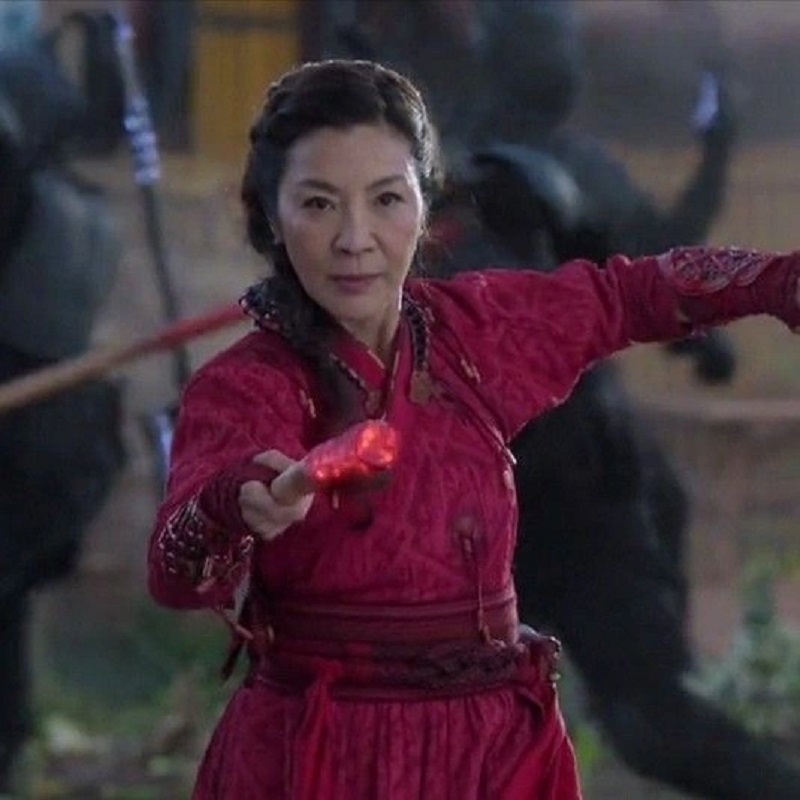
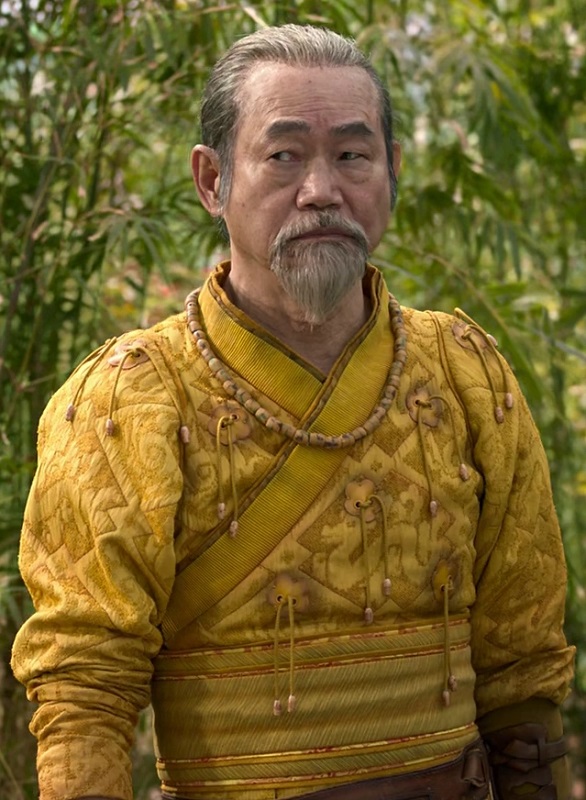
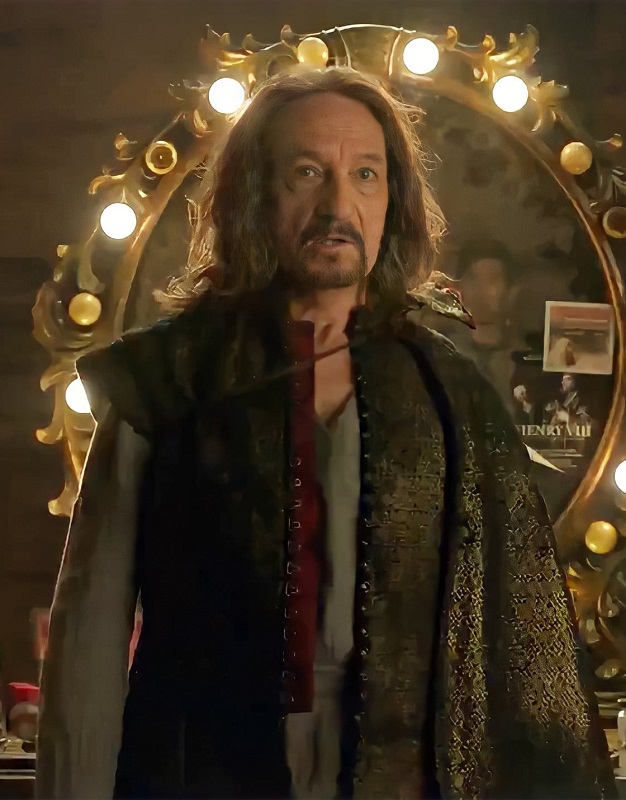
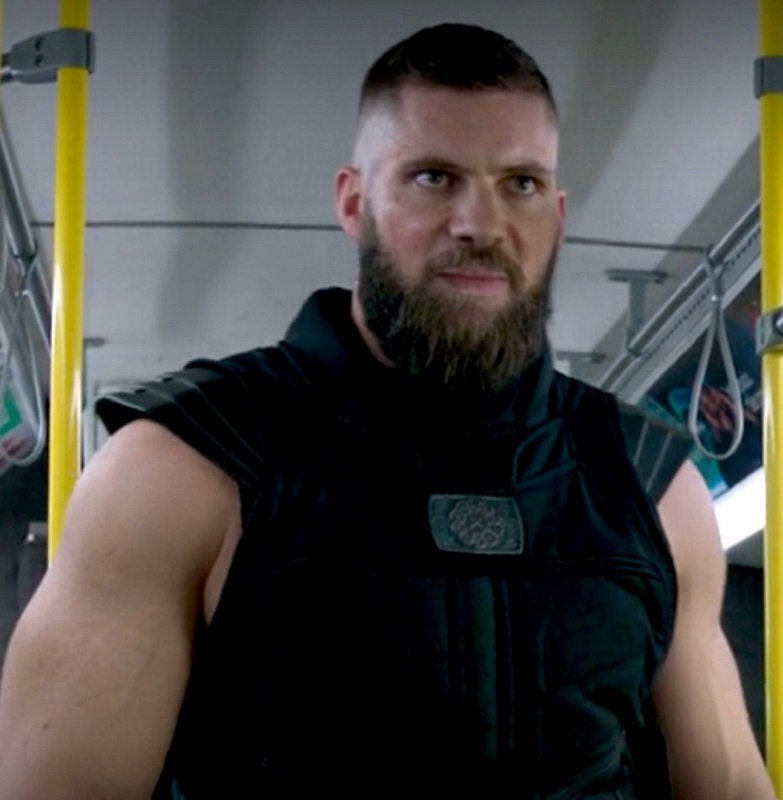
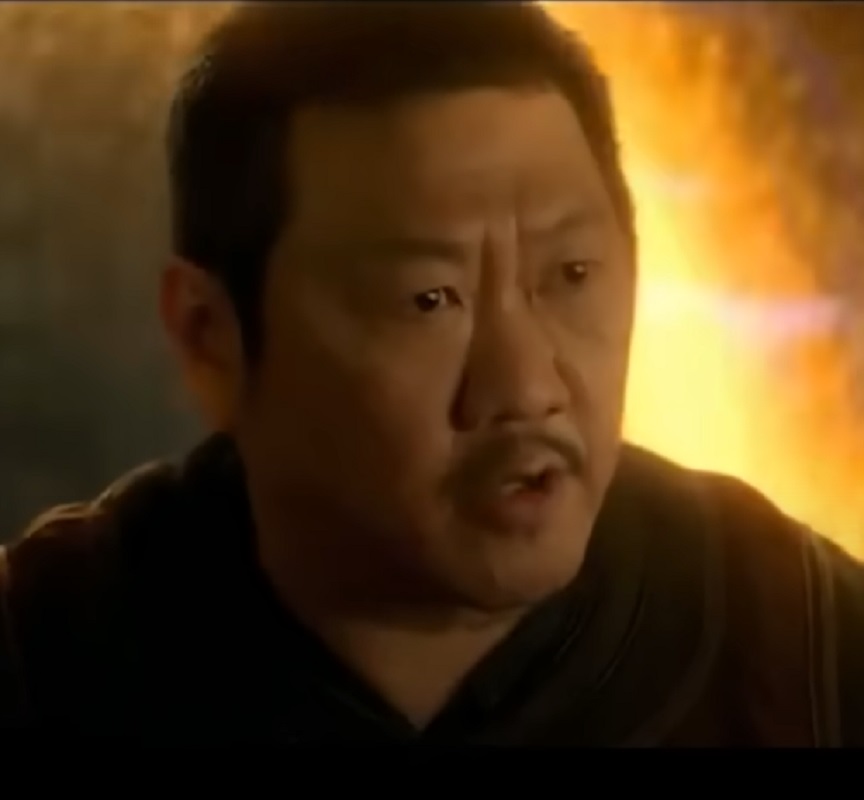
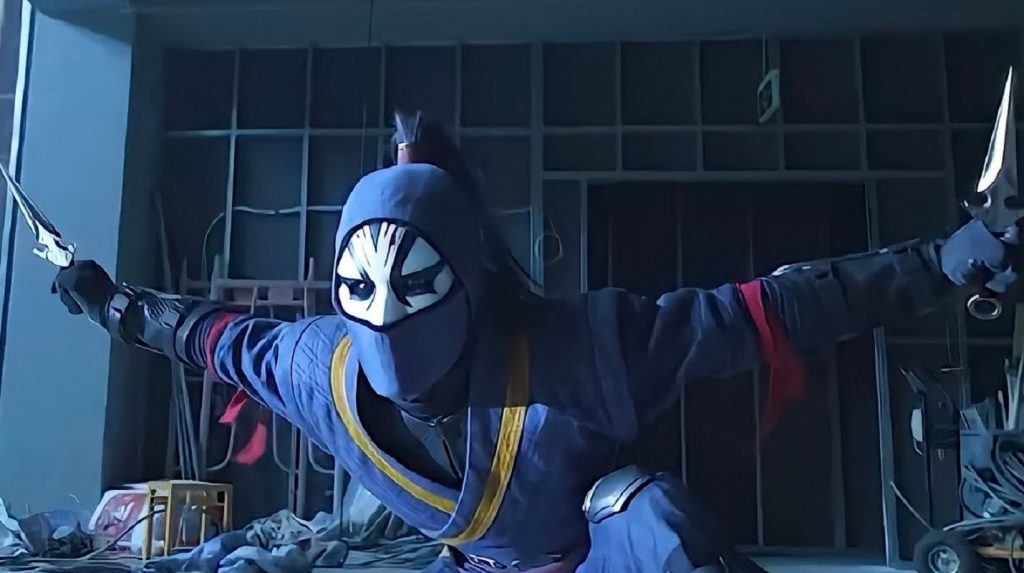
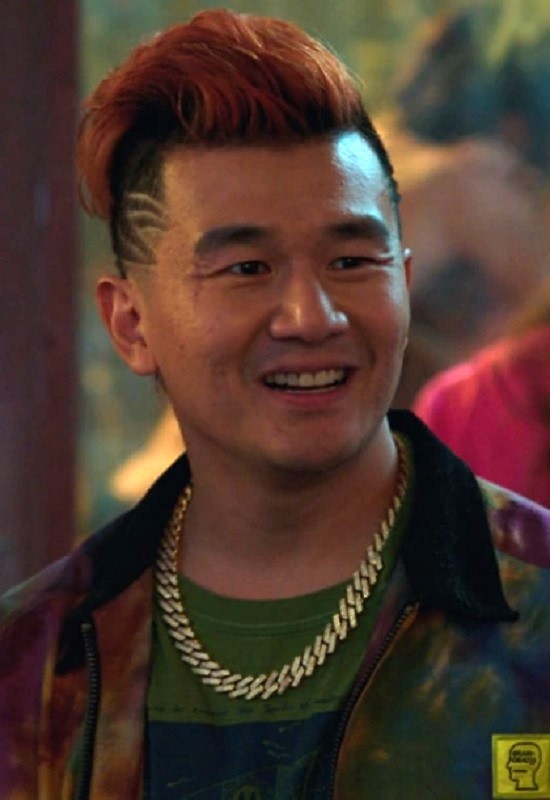
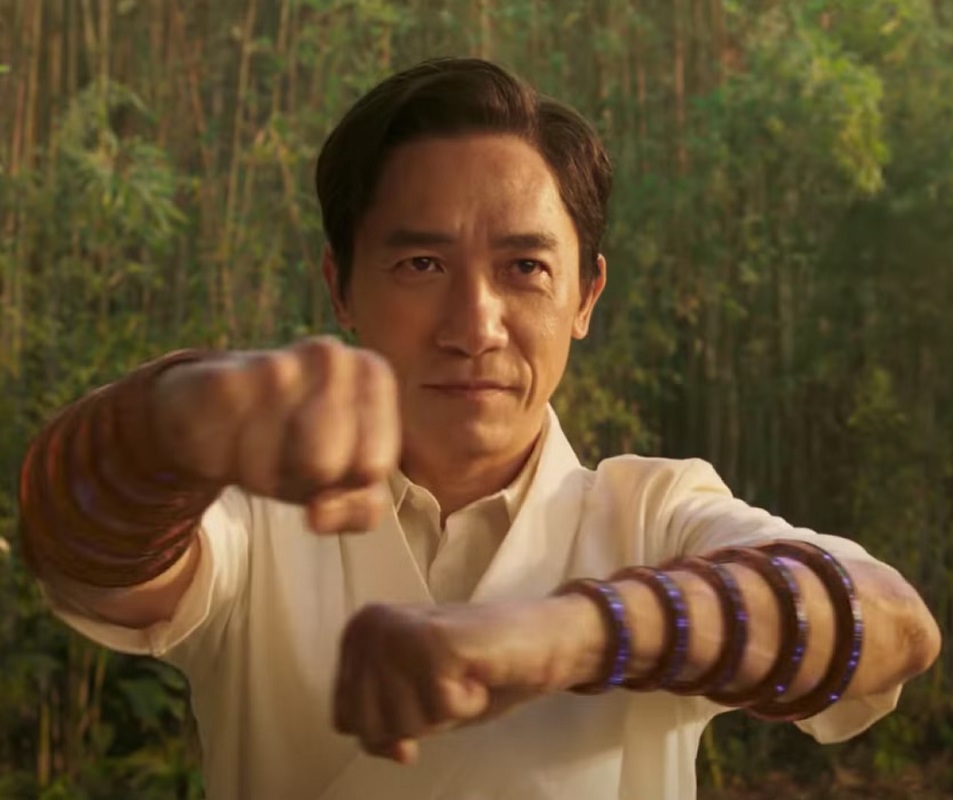












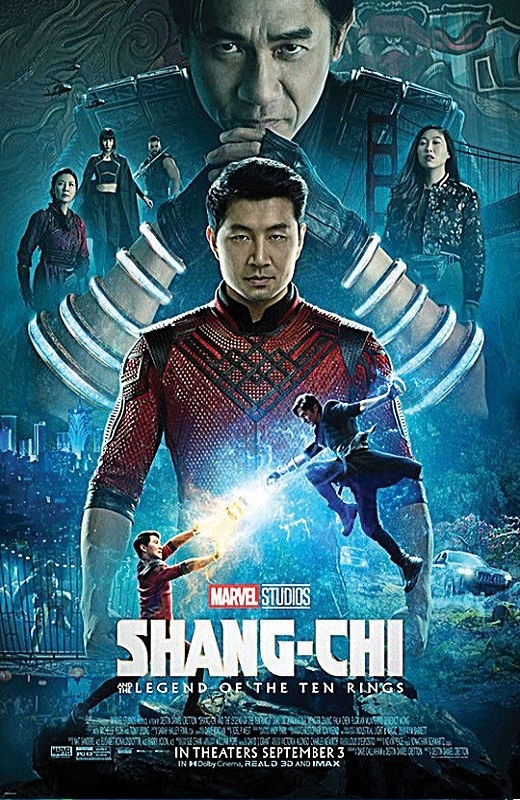
25 – Shang-Chi and the Legend of the Ten Rings
This was a really great movie that introduced a whole bunch of awesome new characters and brought back a few old ones. It was based off the comic book character of the same name, but was modernized for the MCU. It was great to have a mostly Asian cast, the only non-Asian actors being Ben Kingsley, returning as Trevor Slattery, and Florien Munteanu as Razor Fist. Shang-Chi absolutely lived up the high standards of the MCU. It had a big epic story with a lot of intense fast paced action. There was a bit of light humor, and drama that resulted in self-discovery and empowerment. Very Disney, actually.
First of all we get Simu Liu as our lead character, Shang Chi. He is handsome, obviously very fit, and clearly trained in martial arts, which is this movie’s main mode of action. I remember during the 80s when old foreign Kung-Fu movies had a resurgence in popularity. My brothers couldn’t get enough of them. Then there was another renaissance for the genre when Jackie Chan was discovered by American audiences. Chan had a style that was all his own, making prodigious use of the set and whatever physical props happen to be at hand to create a new kind of Martial Arts film action that had some inherent humor and a bit of whimsy. Liu was up to the challenge and was exciting to watch. The fight on the speeding bus is a perfect example of this.
But here, we are given a modern, big budget, high profile film that combines both styles, creating some great fantasy actions sequences. It has become the standard for the MCU to rely heavily on CGI for its visual effects, and this movie is no exception. But as I’ve said before, when the effects have this level of realism, I don’t mind. It looks great on the big screen. There were a number of fantastical creatures that were completely animated, from the cute little faceless animal, Morris, to the giant evil dragon, The Dweller in Darkness, a soul-consuming demon. And of course, there was the beautiful white Great Protector Dragon
And there were several members of the cast, besides the lead, who I really loved. First of all there was Michelle Yeoh, who I have loved ever since I first saw her in Crouching Tiger, Hidden Dragon. She is always awesome, no matter what film or TV show I see her in. But I also really loved the main bad guy-Shang-Chi’s father, Tony Leung, who I would swear, I’ve seen in some other film, though, I can’t remember which, even after reviewing his filmography. He did a great job with the drama as well as the action. Now, I have to admit, the first time I watched this movie, I couldn’t stand the character of Katy, played by the actress/rapper, Awkwafina. I felt she was annoying, and I couldn’t stand her voice, which always sounded like she was on the verge of laryngitis. But I have since warmed to both the character and the actress. Meng’er Zhang played Chang-Chi’s sister, Xu Xialing, a young girl who was the victim of misogyny from her father, but who rose to create an empire of her own, eventually taking over the crime-based Ten Rings Organization from him. Never-mind that Shang-Chi ended up with the actual rings.
One thing in the movie that I always roll my eyes at is the part where Michelle Yeoh is telling Shang-Chi and his friends the history of Ta Lo, and there is an elaborate wooden diorama depicting the story. Really? Someone spent all that time in-universe, carving all that, just so the audience would have something to look at while Ying-Nan offered up a monologue of exposition. That was silly. They did the same thing in Guardians of the Galaxy Vol 2 on Ego. But other than that, the visuals in this movie made full use of that beautiful Chinese aesthetic that is both spiritual and dramatic, that has a sense of history, of fantasy, and of mysticism that are just captivating. It is apparent in their architecture, their clothing, their movements, in their fighting, and in their attitudes. I love watching this movie. It is lush and colorful in such a gorgeous way. And what fantasy lover doesn’t get excited over a battle between two dragons?
Top 10 Favorite Parts















24 – Black Widow
I remember the first time I saw Black Widow. It was in the theater, and it was one of the first movie’s I’d seen after the end of my self-isolation because of the Pandemic. It was really exciting to be able to go back out in public again. It was a great action-packed movie, but it felt like it was a bit of a let-down. It was not as fantastically super-powered as the previous entries in the franchise. There were no gods from Asgard, and no magic wielding monks who could teleport across the globe. And because they dialed the story back to a more down-to-earth narrative, it felt separate from the main tapestry of the MCU, like it didn’t quite fit with what had come before. It definitely felt like a transition into a new era. It was a whole new tapestry that was still somehow connected to the big tapestry of the previous twenty-three movies.
Black Widow was an awesome character who had made the ultimate sacrifice to save the entire universe in Endgame. She had no super-human powers beyond her kick-ass fighting skills and a few tech gadgets like a face-changing espionage device, or a surprise miniature grappling hook. And for her character, that had always been enough. That, and her brains. She was super intelligent. The story was a prequel that took place just after the events of Captain America: Civil War, meaning that she was still an Avenger, though she was on the run from the law.
The more times I see this movie, the better I like it. The story was cool, and we are introduced to several great characters, some of whom are still prominent in the MCU today. We got great characters like Natasha Romanoff’s sister, Yelena Belova, awesomely played by Florence Pugh. Though they were not blood related, they were siblings in a family of Russian undercover agents who were stealing intel from S.H.I.E.L.D. Their mother was a Red Room Black Widow assassin, and the father was the Russian attempt to replicate the super-soldier abilities of Captain America, the Red Guardian. Dreykov was a good enough villain, though he didn’t do much. Same with Taskmaster, though she looked good in her costume and mask. I liked her powers of fighting mimicry, though, I wish they would have developed her more.
I particularly loved David Harbour as Alexei Shostakov. He has obvious super strength and durability, but is not big on brains. He is just so charismatic. And I really loved Yelena Belova. There was definitely a bond between her and Natasha, though there is also a certain amount of sibling rivalry that was explored in a sensitive way. And she is just as skilled a fighter as her Avenger sister. And who am I kidding? I also loved Rachel Weisz as the mother, Melina Vostokoff. She was intelligent and kicked ass with the best of them.
And as usual, the action sequences were thrilling and over-the-top. There were fantastic fight scenes, and the idea of impossible technology that we’ve already seen in the MCU, things like the flying fortress, the Red Room, where all the Black Widow assassins are trained. There was a secret serum in gaseous form that could release a Widow from the mind control of Dreykov, the master of the Red Room, and engineered pheromones that could prevent any Widow from harming him. All stuff that only exists in the comic book world that is the MCU.
But if I had a single complaint, it’s that the whole point of the Black Widow assassins is that they are not endowed with super-powers. The Red Guardian, yes, but not the Widows. Then someone tell me how Natasha can fall from the top of a seven or eight story building, banging into fire-escape railings and AC ducts on the way down, and land in a crumpled heap on the ground without dying? Natasha seems to be able to take a ridiculous amount of serious, life threatening injury, and then shrug it all off without little more than bruises. So maybe she does have a bit of superpower, that of unearthly durability. I always have to roll my eye at that one.
Top 10 Favorite Parts



1943 – Paulette Goddard
So Proudly We Hail
Paulette Goddard was a knockout. And she could act. So why have I only rarely even heard of her? I thought she did a fantastic job, and she really earned her Oscar nomination. This was a much better movie than I was expecting, and the three top-billed actresses all turned in some really great performances. Goddard played Joan O’Doul, a woman who served as a nurse during WWII. She created a character that had a definite arch, and she played it perfectly, making it look easy.
Joan was the girl who couldn’t say no. But when she was shipped to the Philippines to serve on the front lines of the war, she tried to remain aloof and un-entangled with romance. Her priority was doing her duty as a Lieutenant in the military. And she is successful… until she meets a handsome Marine who falls in love with her. But despite slowly returning his affections, I loved that her duty always came first.
What I liked about Goddard’s performance was that there was an inner strength to Joan, and it didn’t soften her beauty in any way. In fact, it enhanced it, making her even more beautiful. There was a scene in which she had fainted from exhaustion, and even then, she tries to get up and continue her work. And later on she has a little monologue that showed why she joined the medical corps, and how she was determined to do her job, no matter what, or how many men she had to help. There was an honest earnestness in her eyes that I admired.
And I also enjoyed her on-screen chemistry with her Marine, Kansas, played by Sonny Tufts. There was a little running gag with Kansas. Whenever he said he never did something, it always happened. So when they are parting, and he tells her he never dies, the look of grief and dismay on her face was real and heart-wrenching. But we are never shown or told of his death. I’d like to think he survived. Either way, Goddard did a fine job, making me like her character, despite some of the silliness written into the part. Like when she put everyone’s lives in danger to retrieve a nightgown during a Japanese attack. Everyone would have died if Veronica Lake hadn’t sacrificed herself to save everyone. Badly played, Joan. But that was the script, not the actress.
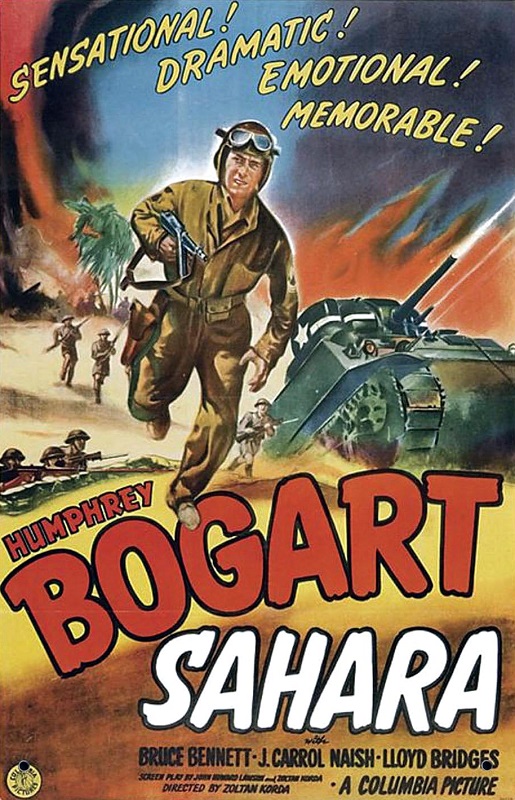
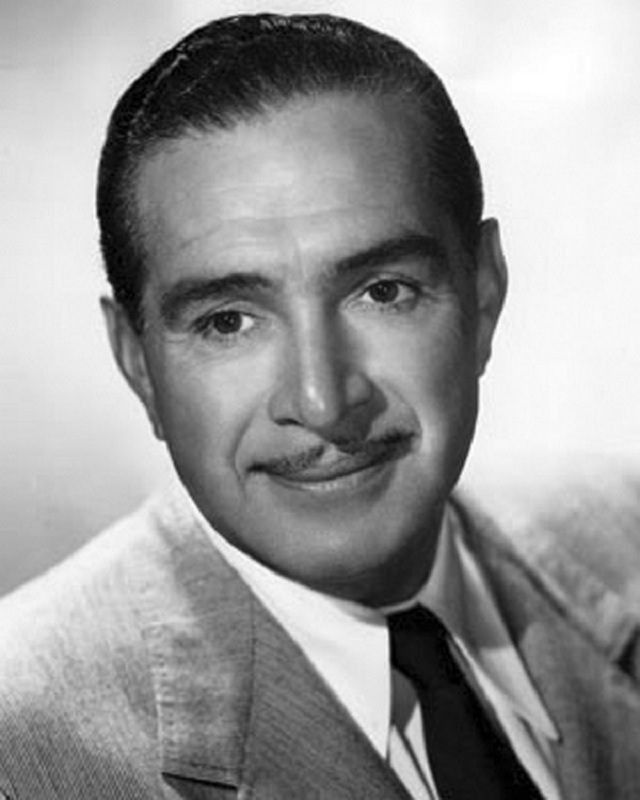

1943 – J Carrol Naish
Sahara
Honestly, I have never heard of this actor before. I have no idea what other films he’s been in, even though Wikipedia says he was in over 200 films in the Golden Age of Hollywood. But I have to say, he did a fine job in this movie. He played an Italian POW during WWII named Giuseppe. The actor was American-born, but he seemed to be able to speak fluent Italian, and his heavy Italian accent, when he spoke English, was constituent and believable.
Even though he was a supporting character, he had a few pretty dramatic moments that made him stand out. He even had the movie’s big anti-war speech. Despite what Mussolini tells us, I have no hate in my heart for Americans, which is a great sentiment to remember. He delivered that little monologue with a fair amount of passion and it sounded honest. After he delivers his speech to an evil Nazi who says he will denounce him as a traitor, he says he’d rather spend his remaining days as a POW in a prison than kill men he does not hate. He is murdered for his principles, but before he dies, he warns the movie’s heroes about the escaping Nazi, saving all their lives. That was definitely his big moment, but it wasn’t his only moment. I liked the one where he begs not to be left in the desert to die.
Naish really seemed to take his role seriously. This must have been a difficult movie to film. Everything took place in a desert and you could tell it wasn’t a set. You could practically feel the heat through the screen. Apparently, the makeup artist were able to make the men appear to be heavily perspiring by coating the actors’ faces with Vaseline and spraying them with water. Naish had a great close-up where the sweat looked real. But he, like all the dedicated actors, had to deal with sunburns and sandstorm, typical of filming in a desert location.
So despite being an Italian, who was supposed to be one of the enemies in the war, Naish did his job well and created a likeable character that probably helped to show Americans that the Italians were not the real bad guys. They were just ordinary people who happened to be on the wrong side of the fighting, most of whom were just obeying their leader. I appreciated the different perspective, and I liked Naish.
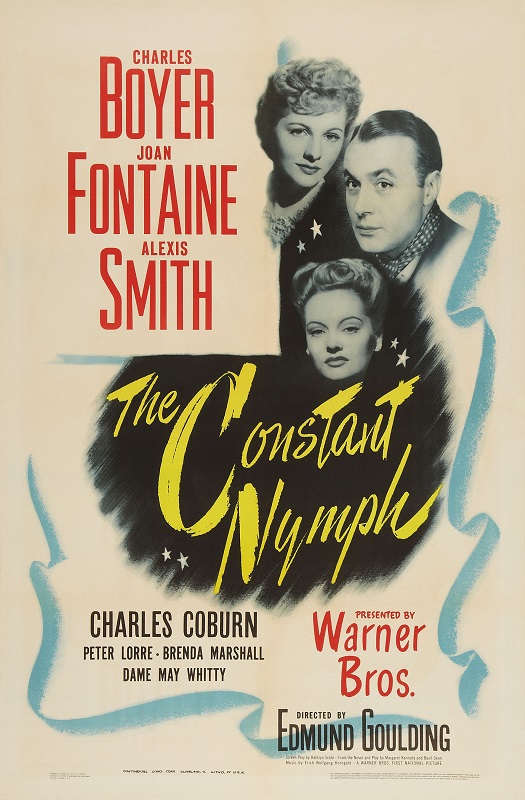
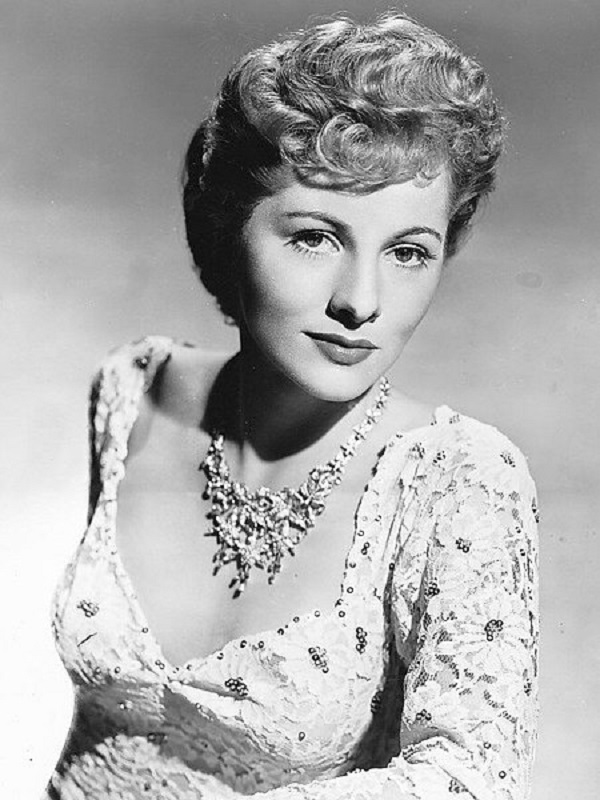

1943 – Joan Fontaine
The Constant Nymph
I’m sorry, but I didn’t particularly care for Fontaine in this film. It dealt with a few things that generally bother me, and sometimes leave me with an icky feeling. It was about a young country bumpkin of a girl named Tessa Sanger, who is around sixteen years old. She is desperately in love with an older man who is a composer. When he marries the girl’s relative, she and her sister go under the guardianship of his new father-in-law and are sent off to finishing school. But her love for the man is so intense and needy that she unwittingly gets his feelings to change from those of a dear family friend, to a decidedly romantic nature.
First of all, Fontaine was too old for the part, and while they did their best to make her appear young and bubbly, there were times when her real age of around twenty-six became very obvious. Second, assuming she was a teenager, here we have Charles Boyer falling in love with an underage girl… again. And finally, even if the character was a more appropriate age, her love was desperate and needy, even to the point of her dying of a broken heart because she could not have him. You could tell right from Fontaine’s first appearance on the screen that her love for Lewis was unhealthy, even hungry. Her feelings went beyond simple love or desire, and bordered on absolute need. It was unnerving to watch in a teenage character.
But I think I was supposed to be swept away by the intensity of her emotions, the purity of her affection. But the way Fontaine played it was just a bit creepy in its own way. Still, she did a good job playing the undisciplined, unrefined country girl. And when she left behind the unkempt hair and bare feet for the smart boarding school uniform, Fontaine did a very good job of acting more mature. She played the part as a little more sensible and a little less excitable. But I still didn’t really like Tessa. I guess it was just the way she was written.
And something else that bothered me. I kept hearing what I sometimes call the “please don’t hit me” voice that was appropriate for the Second Mrs. DeWinter in Rebecca, but just didn’t fit the character in the same way here. This one was a miss for me. And I think it may have been because Fontaine was miscast.



1943 – Gladys Cooper
The Song of Bernadette
Gladys Cooper had a small but powerful part in this wonderful movie. She played Sister Marie Therese Vauzou. She was a nun who believed that true salvation could only come through self-denial and suffering. She doubted Bernadette’s miraculous visions, not because the girl was crazy or lying, but because she was innocent and knew nothing of true suffering. She was actually incredulous that God would choose such a simple young girl as his vessel, rather than someone like herself who had spent a lifetime torturing herself to attain a state of spiritual worthiness.
At first, Cooper just played the woman as a strict and pitiless Catholic nun, a schoolteacher in the village of Lourdes, but later she goes on to be the Mistress of Novices for the Sisters of Charity of Nevers. This was one of the films few departures from reality, as the real Sister Vauzou was never a schoolteacher in Lourdes. But I suppose when you have an actress of Gladys Cooper’s caliber, you use her as much as you can.
I think she wasn’t so much a doubter of Bernadette’s visions, but she was jealous of them, and so denied them on principle. Her most powerful scene was the one in which she finally confronts Bernadette. Her powerful monologue was captivating, and Cooper was incredible. “In all our sacred history, the chosen ones have always been those who have suffered. Why then should God choose you? Why not me? I know what it is to suffer. Look at my eyes. They burn like the very fires of Hell. Why? Because they need sleep. They need rest which I will not give them. My throat is parched from constant prayer. My hands are gnarled from serving God in humiliation. My body is pain-wracked from stone floors. Yes, I have suffered because I know it is the only true road to Heaven. And if I, who have tortured myself, cannot glimpse the Blessed Virgin, how can you, who have never felt pain, dare to say you’ve seen her?”
Cooper was so good, and also, the penitent prayer she utters in the next scene was great, too. This is definitely a movie to watch, not just because of the incredible script, but because of the intense performances of actors like Gladys Cooper.



1943 – Anne Revere
The Song of Bernadette
I really liked Anne Revere’s performance in this movie. She played Louise Casterot Soubirous, Bernadette’s mother. She was a peasant woman who began her character arc as a doubter of her daughter’s miraculous visions. And by the end, it never made any specific references to her being an actual believer, but through everything, she never stopped being the girl’s mother, despite all the ridicule and hardships she and the family had to endure. Like when the police would stop the family in public to take Bernadette in for questioning, her righteous anger was real.
There was real sympathy when Bernadette was in distress and needed a mother’s love to turn to for comfort. She played the parental care and unconditional love the part required perfectly. She was not a beautiful woman, but that was entirely appropriate. Indeed, she had a remarkably plain face, a feature that was intentionally enhanced with makeup and lighting. After all, she was a poor peasant woman, not a glamorous socialite. To her credit, she really looked the part.
She had several scenes that really stood out to me. One was where she is called to the doctor’s because Bernadette has fainted. But when she arrives, Bernadette seems to be just fine. The anger and embarrassment she displayed were palpable. What will the townspeople think of the mother of the girl who was faking illness to garner sympathy, lying about visions to get attention? Revere’s acting was particularly good in that scene. Another that stands out is the one where Bernadette can’t sleep because she is worrying about her visions of the Lady. The sweet motherly care with which she comforts her daughter was touching.
And then there was the scene where Bernadette is leaving to join the Sisters of Charity of Nevers. I loved the way Revere handled that scene. Yes, there was sadness in her face, but also a hint of pride as well, seeing that her daughter was doing a noble thing, fulfilling the calling of one who had been touched by divinity. It was a very tender scene and Revere handled it with grace and care. I am totally behind her Oscar nomination, though looking at her competition, I can see why she didn’t win. Katina Paxinou just had a more powerful performance.